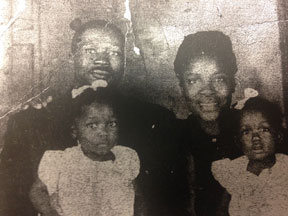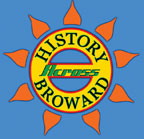
 Woodlawn Connection: The Bellamy family
Woodlawn Connection: The Bellamy family
This is an early photo of the Bellamy family featuring Donnie Bellamy with his wife and children. (Photo is courtesy the Bellamy Family.)
By Anne-Marie Rene
On Dec. 4, 2014 and on Feb. 5, 2015, members of the History Across Broward program from Boyd H. Anderson High School interviewed members of the Bellamy family, which was one of the first African American families to come to Broward County. The members of the family interviewed included Mamie B. Smith, Rosetta Change, Ethel Wiggins, and Benjamin Stroman.
Throughout the duration of the interview we discussed many topics that covered civil rights, segregation, and their families’ history.
The first of the Bellamy family to come to Broward was their father, Donnie Bellamy, who was an African American father of five, born on April 4, 1905 and who died on Nov. 9, 1947. Bellamy was a share-cropper during the 1920s through the early ’40s on a plantation that was owned by Arthur Syllus, located in Hammondsville, an area that is now part of Margate.
Being one of the first families to arrive in Broward County in 1926, the Bellamy’s had the opportunity to experience life changing events throughout their lifetimes with education and the evolution of society during their time.
The Bellamy’s lived throughout the time of segregation when African Americans were restricted and were not allowed to be out or on the “other side” of town or attend schools with white students. The Bellamy’s settled in Northwest Eighth Street and 19th Terrace, which is close to Woodlawn cemetery where members of the Bellamy family are buried.
The three Bellamy sisters, Rosetta, Mamie, and Ethel, and their cousin, Benjamin F. Stroman, that were interviewed, all attended Dillard High School and stated in the interview that Dillard was indeed the only Black school in Broward.
During the interview we discussed their education at Dillard and their experiences and one thing that the Bellamy’s remember the most are their teachers, especially Ms. Estelle Pinkett, a former math teacher at Dillard High.
Education and the family unit were the most important parts of the African American life.
The Bellamy’s stated that books were in short supply at Dillard and they only had old and used books.
The basic classes they took were pretty much the same as today, except for the AP, IB, and AICE courses.
One interesting difference that was mentioned by Rosetta B. Change, the second oldest of the sisters: “We had to make meals and you would have to make a complete meal for your family in your home, and the teacher came to the home to grade you.”
High school students in the 21st century do not get to experience the same level of involvement of the teachers as the students back in the ’20s did. High schools or schools in general in that period made it a priority to be as involved in the students’ lives as possible.
One other interesting connection about the ’20s, ’30s, and ’40s was that during hurricane season, the people of the African American community would go to abandoned armories and train depots to protect themselves from the weather.
They would bring along with them food and supplies, and one very important memory for the Bellamy’s during the hurricane season was the tea-cakes.
This is what Change, the second oldest of the three had to say about the hurricanes: “Let me tell you something silly about us kids when we were growing up. We used to love hurricanes. We would look forward to when the hurricanes were coming because when they came, our mom would have something called Tea Cakes and we wanted these tea cakes so we would pray for a hurricane and we couldn’t stay in our home.
“We would go to the train depot and we would stay there during the hurricane, and we were crazy; we would play in that water you didn’t know what you were stepping on, there were snakes and we would get something else.”
It is amazing to see the parallels between the generations before our time and now. Hearing stories about our past helps us to realize our greatness and how much the African American community has contributed and through interviewing these amazing individuals in the Bellamy family, the members of the History Across Broward program have learned about the important history of African Americans.



Be the first to comment